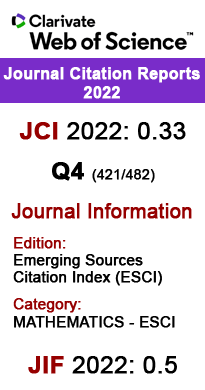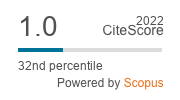Malaysian Journal of Mathematical Sciences, January 2020, Vol. 14, No. 1
Exponential Sums for Eighth Degree Polynomial
Low, C. W., Sapar, S. H., and Johari, M. A. M.
Corresponding Email: sitihas@upm.edu.my
Received date: 29 October 2018
Accepted date: 30 September 2019
Abstract:
Let \(p>7\) be a prime, the exponential sums of any polynomial \(f(x,y)\) is given by \(S(f;p^{\alpha})=\sum_{x,y \pmod{p}}e^{\frac{2\pi if(x,y)}{p^{\alpha}}}\), where the sum is taken over a complete set of residue modulo \(p\). Firstly, Newton Polyhedron technique was used to determine the estimation for the \(p\)-adic sizes of common zeros of the partial derivative polynomials \(f_x\), \(f_y\) which derive from \(f(x,y)\). We continue by estimating the cardinality \(N(g, h; p^{\alpha})\) as well as the exponential sums of polynomial f(x; y). Throught out this paper, we consider the polynomial of eighth degree with two variables in the form \(f(x,y)=ax^8+bx^7y+cx^6y^2+dx^5y^3+ex^4y^4+kx^3y^5+mx^2y^6+nxy^7+uy^8+rx+sy+t\).
Keywords: \(p\)-adic sizes, Newton Polyhedron, Indicator diagram, Cardinality, Exponential sums









